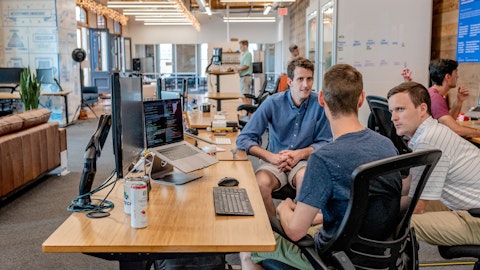Our delinquencies are surprisingly low at historical lows. The overall quality of the portfolio appears to be good. We are focusing on certain segments that we believe globally are soft. You’ve mentioned office. That’s one area we look at, we focused on. With thank goodness, we have tremendous granularity and opt credit culture that encourages prompt action. And I think that’s what you’re seeing. There was a slide we presented. I think in the past, I don’t know if it’s in the deck with charge-offs versus reserve build for us. We tend to be very early at reserving and then our charge-offs end up better than the peers. So that’s a testament to Gary and his team and getting out early addressing situations early helps you get out of trouble so that you’re not experiencing the charge-offs down the road, waiting and not addressing issues creates a shortfall which exacerbated credit problems when you’re in a cycle.
So I don’t know — I think we’ve done a great job. He won’t say that, but I’m going to say it about.
Brian Martin: No, I appreciate it. The numbers speak for themselves, Vince here and Gary, I mean, they’re great and even the criticized not being up much is testimony to kind of the portfolio and the granularity. So just trying to stay in front of it if there’s things that are coming down the pipe. Gary, you mentioned that you distressed testing. Was there anything specific you guys stress tested this quarter that you would call out? Or just in general, that you just continue to stress trust the entire portfolio?
Gary Guerrieri: Yes. It’s a general stress test of the entire portfolio on a loan level basis, Brian, so it is a really deep dive every quarter that Tom Fisher and his team undertakes. We review that every quarter. Updates are made on a monthly basis when necessary. So it keeps us forward looking from that perspective. And I think it’s a best practice that we’ve put into place that has been very beneficial as we look forward through the economy and what we expect down the road.
Brian Martin: Got you. Okay. Thanks. And then maybe just one or two others. So just on the two things on the loan side, just maybe just kind of how the pipeline — I appreciate the guidance for the year. Just kind of — just trying to get a lot of where the pipelines are today on the commercial side primarily. And then just I think you mentioned on the mortgage side, you were a bit more aggressive on the sales. I mean, first quarter is typically a seasonally weaker quarter. So I guess do you expect to remain aggressive on the sales, which could mean that potentially 1Q is a bottom for the mortgage revenue as you look throughout the year? Is it any difference in strategy there as you go to the balance of the year?
Vince Delie: Yes. I think the first quarter typically is seasonally slow, right, because they are less — especially when we’re focusing on purchase money mortgage loans because of fewer transactions that occur in the first quarter. I would expect that to build through the next two quarters and then come back down again. On the — just speaking to the purchase money side conforming mortgage loans, I would expect that to happen. There are other origination areas that will produce through that we have physicians, loans that we do, which are pretty much throughout the year. So they kind of offset some of the declines in the later happen on the conforming stuff. So you’ll see more jumbo private banking loans coming online, which is why we do what we do.
We want to balance out what goes on the balance sheet and what becomes sale. Our team has done a great job. We have terrific people in the mortgage business. We’ve grown it over the last 10 years or so. I mean it’s a big part of our business and a key product for consumers. So it really adds to our ability to obtain clients. And I think we’re going to continue to focus on it and manage it very conservatively, but I would expect that to contribute more over the next few quarters, I think it’s fair to say, given the seasonality.
Vince Calabrese: And I would just add from an income statement standpoint, I mean, baked into our guidance is the mortgage banking income coming down a little bit from the first quarter level. That was going to be a function of how much we do sell. I mean we’ll continue to manage like I said, seasonally, second and third quarter, quite a big list in production, which is what’s stated into our guidance and then it falls and then it kind of falls off over the quarter.
Vince Delie: But I’m pretty obvious think they’re doing pretty well. And we’re very well entrenched. We have great people in that business, like I said. So I feel good about it.
Vince Calabrese: The activity is very good. Even in the first quarter was very good, too, and then expect it to see the move up in the second, third, like Vince said. Obviously impacted by interest rates. I mean that if rates go up, that game over. We’ll talk about it down the road. But I think given the way things are today, and in a stable interest rate environment for now, they should pick up. There should be more activity.
Brian Martin: Got you. And just on the commercial pipeline, what you’re seeing there?
Vince Delie: Yes, the pipelines — they’re up 15%, and the overall pipeline is up from the last quarter. Remember, we had a big quarter closing out in December of last year. So the fourth quarter of last year was pretty solid from a production perspective. So pipelines are rebuilding, South Carolina is at their second highest level historically. So there’s a lot of activity there. We’ve always got a nice pipeline that what we call the capital region, which is a central part of the state. It has a tremendous pipeline and we’ve seen some good activity in some of the rural Pennsylvania markets. The folks in State College, Tony Marfisi and his team doing a terrific job. I mean we’re seeing a lot of activity and good solid middle market C&I opportunities. So I would expect us to continue to build the pipeline as we move through the year and businesses, hopefully become more confidence in the economy.
Brian Martin: Got you. Okay. And the last one for me, and I’ll step back. Was just the — it sounds like the DDA level your comfortable that you can maybe sustain this around the current level? And then just kind of the outlook on the capital flexibility with kind of reaching a record level of TCE and CET1. Just kind of your thoughts on capital deployment here if it’s still just primarily organic growth?
Vince Calabrese: Yes. I would say, I mean, on the capital front, we still like 10% is our CET1 target. We think that’s the right level, just given our risk profile of the balance sheet and also the high level of capital generation that we’ve been producing. If you look at our — what’s baked into our guidance, the capital ratio is kind of gradually build from here between now and the end of the year. As you saw this quarter, we had a nice pickup in CET1 and TCE ratio. We have commented in January that once the indirect sale kind of cleared that would be additive. Added like 10 basis points CET1 relative to the TCE ratio. So we have that and then we’ll kind of gradually build from there. And we’ll be opportunistic as we have been in the past. We’ll look to do some buybacks. We have issuance of stock in the first quarter from normal incentive stuff. We could repurchase some of that and look to do some level of activity as we go through the year.
Vince Delie: Given the profitability of the company, we have options, and we’re building capital you go back pretty far, so 8% is a pretty nice number for us. It’s a solid TCE ratio.
Brian Martin: Got you. Okay, I appreciate taking questions. Thank you.
Operator: And ladies and gentlemen, with that being our last question, I’d like to turn the floor back over to Vince Delie for any closing remarks.
Vince Calabrese: I just wanted to make one comment. There was a question earlier about the swaps we have rolling off next year. I mentioned kind of what we’re receiving we’re paying 5.44% on that $1 billion. So just as far as the math, as you get into 2025, it’s basically $250 million a quarter kind of sub-1% what we’re receiving and we’re paying around 5.44%. So that will be a benefit next year starting in January. Just wanted to clarify that.
Vince Delie: Thank you, everybody. Appreciate it. Appreciate the support from our shareholders. And again, very appreciative of our employees and the teams that we have and their desire to win. So we have a great culture, winning culture and people just want to do the best they can for their clients and compete. And I think we’ve proven that we do that very effectively. So thank you. Thank you, everybody.
Operator: Ladies and gentlemen, with that, we’ll conclude today’s conference call and presentation. We do thank you for joining. You may now disconnect your lines.
Follow Fnb Corp (NYSE:FNB)
Follow Fnb Corp (NYSE:FNB)
Receive real-time insider trading and news alerts



